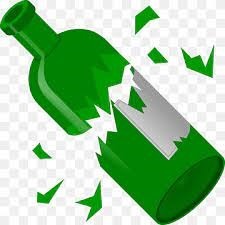Parshas Chukas
Who Would Have Thought The Broken Bottle Could Be So Powerful?!
“This is the law [regarding] a person [אָדָם] who dies in a tent; anyone who enters the tent and everything that is in the tent shall be unclean for seven days.” (Bamidbar 19:14)
More than 100 years ago, a poverty-stricken rabbi from Jerusalem went to Italy to raise funds for his family. After his boat docked on a Friday morning, he started walking, hoping he would find a Jewish neighborhood. A horse-drawn carriage drew alongside him and stopped. It turned out that the rider in the wagon was a very wealthy Jew. He greeted the rabbi warmly and invited him to his home for Shabbos. At the Shabbos seudah, the rabbi was flabbergasted by his host’s enormous wealth. Gazing at the breakfront which was full of crystal, silver, and gold, the rabbi noticed a broken glass flask. It was so out of place that the rabbi asked why the flask was placed there. The wealthy man then told his story. He had grown up in Amsterdam. When he was a teenager, his grandfather, who was in failing health, had asked him to come to Italy to help in his store. Soon after, his grandfather died. He loved the business and became very successful and very wealthy. He became so involved in his business that, little by little, he slid away from Judaism. One day, he was walking and heard a Jewish child scream. The child couldn’t stop crying and repeating, “What will I tell my father?” Apparently, the little boy was very poor. His father had saved a few coins to purchase a jar of olive oil for the Chanukah menorah. The child made the purchase but not bring it home right away. In the interim, the jar fell and broke, and the olive oil spilled out. The wealthy man took the little boy back to the store and bought him a new jar of olive oil. Afterwards, he felt haunted by the boy’s words, “What will I tell my father?” He thought to himself, what would he tell his Father in heaven after 120 years. He had drifted so far from Judaism, what could he say to Hashem? Thereupon, he gathered up the broken glass of the flask and brought it home. That night, to the surprise of his family, he lit a Chanukah candle. One thing led to another, and he eventually he became an observant Jew, teaching his family along the way. After hearing the story, the rabbi understood why that broken flask had a position of prominence in the breakfront. It was instrumental in re-igniting the pintele yid, the spark that is in every Jewish soul. (Echoes of the Maggid by Rabbi Paysach Krohn)
In the time of the prophet Yirmiyahu, the Jewish People served idols. Hashem asked Yirmiyahu to exhort the Jews to repent (Yirmiyahu 2:2-3). Rashi and Radak say that Hashem desired to shower the Jews with compassion because Hashem remembered the kindness of their forefathers, in following Hashem into the barren desert after leaving Egypt. The Jews showed their faith in Hashem by following Moshe and Aharon into a desert without provisions.
Although the Jews were serving idols, they were still called “holy to Hashem” (Yirmiyahu 2:3). Rashi says that the Jews are considered holy like Terumah, the first fruits of Hashem’s harvest. Radak adds that the Jewish People are compared to the first of the harvest before the Omer, which is forbidden to eat. Whoever eats it is liable. Even when Jews sin and are punished for their sins, the nations who harm them are punished because they are harming Hashem’s “first fruits”.
The Yalkut Shimoni (Yirmiyahu, 265) adds that even during Yirmiyahu’s time, when the Jews were serving idols, Hashem, nonetheless, called them, “בְּנִי”, “my son”.
In the Midrash Shocher Tov (Tehillim 14:4) we see that even when we are at our low point, we are considered holy to Hashem. During the destruction of the Beis HaMikdash, when the Babylonians ate the holy meat that was left from our korbanos and ate the lechem hapanim, the 12 loaves of holy bread, the Jews were at a very low point. Yet, they were still called “holy to Hashem”.
It says in this week’s parsha, “When a person dies in a tent, whoever enters the tent and whoever is in the tent shall be impure for seven days.” (Bamidbar19-14)
The Ohr HaChaim HaKadosh zt”l quotes the Talmud (Bava Metzia 114A). The rabbis taught that the description,”אָדָם ”, “a person” [who dies in a tent] only applies to Jews. The Torah, therefore, teaches that only the dead bodies of Jews are capable of conferring ritual impurity on people who are under the same roof; the dead bodies of Gentiles are not able to have that effect on anyone under the same roof with them. What is the reason for that? Only people who have been given the Torah have absorbed the kind of sanctity during their lifetime which attracts the spiritually negative influences, to their remains.
Even when a Jew sins, he is stilled beloved by Hashem as a child is to his father. He has inherited within him, genetically, a faith in Hashem, as his forefathers had when they followed Hashem into the desert without knowing how they would obtain food. Furthermore, because each Jew received the Torah at Har Sinai, each Jew is a holy person.
We must view every single Jew with love, as each Jew is holy and special to Hashem!




